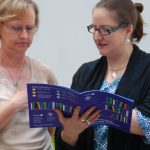
New area of work supports critical thinking skills in East Africa
INASP is leading a new area of work to help young people in Kenya, Tanzania and Uganda to use their skills and ideas to tackle social and economic problems.
The new Transforming Employability for Social Change in East Africa (TESCEA) partnership will design curricula emphasizing critical thinking and problem-solving skills, and design an open online course on teaching for problem-solving that enhances graduate employability.
In addition to INASP, the TESCEA consortium includes Mzumbe University (Tanzania), University of Dodoma (Tanzania), Gulu University (Uganda), Uganda Martyrs University (Uganda), Association for Faculty Enrichment in Learning and Teaching (Kenya), LIWA Programme Trust (Kenya) and Ashoka East Africa (Kenya).
TESCEA, which is scheduled to run for four years, will help young people in Kenya, Tanzania and Uganda to use their skills and ideas to tackle social and economic problems. It will support universities to better prepare graduates to secure employment, act entrepreneurially to create their own jobs, or meet community needs as social entrepreneurs. TESCEA will also develop a scalable model that can assist other universities in the future.
By transforming university teaching and learning, embedding critical thinking and problem solving skills in curricula and pedagogy, and forging stronger connections with employers and communities, TESCEA aims to give 3,000 graduates more ready access to employment and entrepreneurial opportunities within four years, rising to 20,000 graduates within 10 years.
TESCEA will achieve this by:
Facilitating new approaches to learning – strengthening the ability and motivation of academics to deliver student-focused teaching that helps students learn how to think, not what to think, focusing on critical thinking, problem solving, negotiation and relationship development
Strengthening connections between universities, local employers and communities – fostering relationships between universities, employers and local communities to enable the design of relevant curricula and practical internships
Developing approaches and tools to enable scale up – developing a CPD toolkit for lecturers, including an open, online course to allow academics across the region to access training, advice and mentorship on curricula and pedagogical change.
TESCEA will actively address the inclusion of women and other disadvantaged groups by seeking diverse industry and community role models, and identifying and addressing barriers to learning.
The partnership will lay the foundations – through knowledge, networks, skills and tools – to enable universities across East Africa to produce graduates who have the skills and competencies that local employers and communities need to solve real-world problems. It will also change perceptions of the role that graduates can play for employers and communities, and the role that employers and communities can play in enhancing graduate employability and entrepreneurship.
TESCEA is led by INASP and funded by the UK’s Department for International Development (DFID) as part of DFID’s SPHEIR (Strategic Partnerships for Higher Education Innovation and Reform) programme. SPHEIR is a competitive grant scheme designed to catalyse innovative ‘partnerships’ in low-income countries to improve the performance, governance and influence of higher education systems and institutions. SPHEIR partnerships seek to transform the quality, relevance, access and affordability of higher education to achieve sustainable change in higher education systems.
For more information on SPHEIR, click here and follow on social media via #SPHEIR. For more information about the TESCEA project, contact Jon Harle, jharle@inasp.info.

 Previous Post
Previous Post Next Post
Next Post


